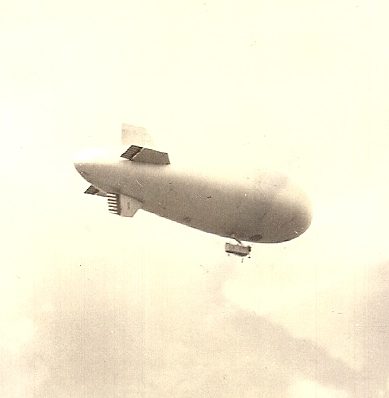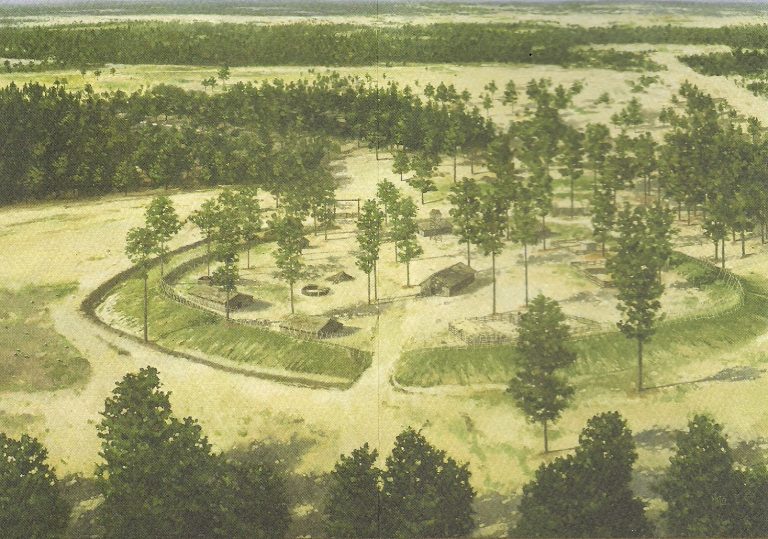Rickey Robertson's Stories from across the Sabine River: Peason, Peason Ridge, and the Southern Confederacy
PEASON RIDGE TOUR 2019
Saturday, April 27th was a beautiful spring morning and a great day for the annual Peason Ridge Heritage Tour sponsored by the Joint Readiness Training Center and Fort Polk and the Cultural Resources Section at Fort Polk. Each year those folks interested in traveling throughout Peason Ridge gather and go and see and visit many of the historical sites , old home sites, and training areas located on this vast area located in Natchitoches, Sabine, and Vernon Parishes. And it is an area that is filled with history dating back to the Native Americans who first settled here and from the days of the Louisiana Purchase when settlers and homesteaders began to arrive and carved out farms.
As Heritage Family Members and visitors arrived at Pine Grove Baptist Church parking lot they greeted each other and boarded the tour bus provided by the US Army at Ft. Polk. There to greet the tour group were Colonel Gregory Cannata and Lt. Colonel Johnathan Graebener, Peason Ridge Live Fire Division commanders. And a surprise also arrived. Commanding General Patrick Frank and his wonderful wife arrived and gave everyone a short hello. We headed out and arrived at the 8000 acre Drop Zone and Peason Forward Landing Zone where everyone got off the bus to view this remarkable area. Years ago the homesteaders and settlers of Peason Ridge ran hundreds of head of cattle and other stock over this area now used for airborne operation.
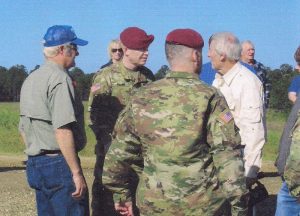
General Frank, Lt. Colonel Graebener, and Rickey Robertson, the tour guide for the event, addressed the large group. General Frank told of how the lands of Peason Ridge were of vital importance to the US Army as they train brigade level units at this location. All training on Peason Ridge is live fire. Lt. Colonel Graebener advised of the airborne operations and the various training scenarios used to train the various units of the US Army. All Army units when they leave Peason Ridge are ready to be deployed overseas. And Rickey Robertson, tour guide and Peason Ridge Heritage Family member, gave a short history of the area, telling of a special way of life that the homesteaders and settlers of Peason Ridge once lived. These settlers left everyone their culture, heritage, and way of life. This way of life was almost lost when in 1941 the army used imminent domain to take these farms . One of the worst things that these landowners had to face when forced off their old lands was that the army did not pay them for one year. If their families, friends, and neighbors had not let them get corn out of their cribs, meat out of their smokehouses, and food from their pantries they would never have survived. But in 2007 this changed when the US Army started the Heritage Program in which the sacrifice of these families was recognized. Now our history and way of life are again being told to the younger generations. And the Army is working with these families to save their history and the Army is now the stewards of our old lands and home places. You may ask just what is a heritage family? They are the families who originally homesteaded and settled the lands of Peason Ridge and Camp Polk and who were removed from their homes by the army in 1941. I am a proud Peason Ridge Heritage Family member and I cherish the memories of my family who once owned and lived on these lands.
Several of those on the tour were Heritage Family Members. Randy Sandell, grandson of Rev. A.F. (Preacher) Sandell, was able to attend this tour. As we arrived at his grandfather’s old home place, Randy told me that “as I looked out the window of the bus I wondered what it must have been like for Grandpa, Grandma, and fourteen children trying to make a living off the land and what they must have had to endure to earn what little they had accumulated and how challenging it must have been to leave it all behind and start over!” Michael Presley was shown his grandfather Jim Owers’s old home site. He was able to see the large oak tree in the old yard and could make out where the old well once was located. Yes, he was touched by being back at his grandfather’s old home place. A tour that was filled with memories of days long gone. But a tour that revived us all with precious memories of our ancestors.
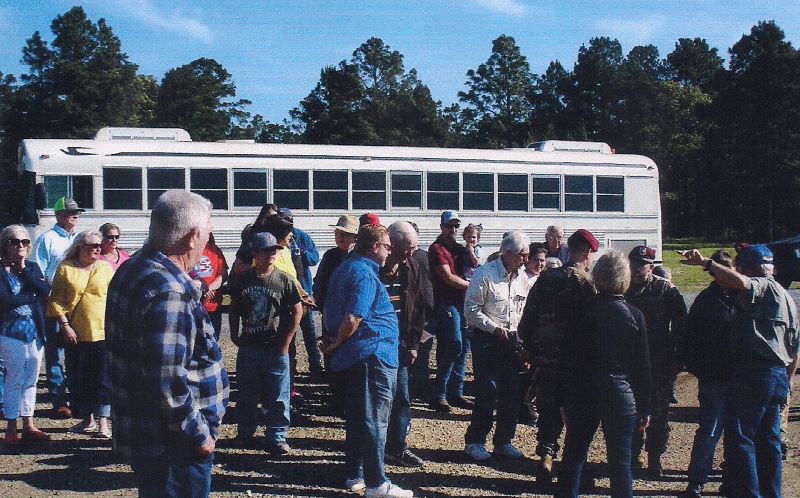
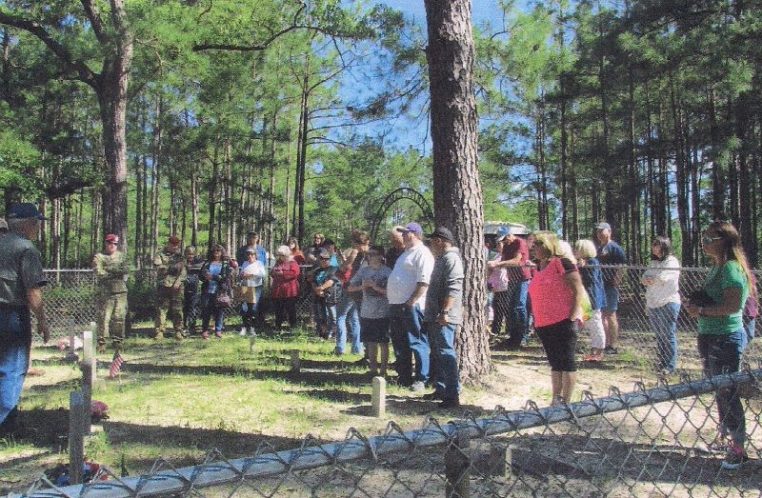
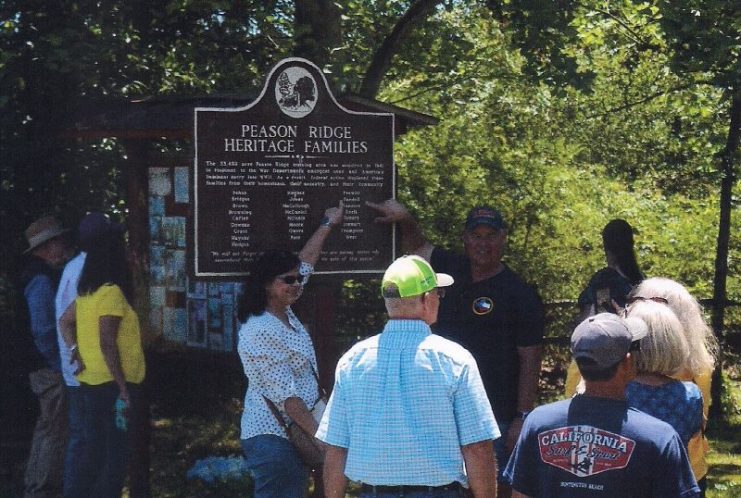
At the Merritt Cemetery everyone took a break and had water and snacks provided by Cultural Resources and also old time syrup tea cakes made by Patsy Robertson. The tea cakes were an old staple of the type of treats made by the Heritage Families so many years ago. We headed out to the large Live Fire Village where Lt. Colonel Graebener advised the tour group of the types of weapons that were used in the assault on this large village and of the types of tactics and types and sizes of the units who train there. Everyone got a first-hand view of this major training site. As we headed further on the tour we went through the lands where in the 1700 and 1800s the buffalo grazed and the Native Americans lived. Further into the tour we arrived at Church Gathering Hill, the site where the settlers and homesteaders would gather to worship before any churches were built in the area. Circuit riding preachers would come and preach God’s Word from the back of a wagon. The families would bring their lunch and would have dinner on the grounds after the service. And if someone was saved during the service they would go to nearby Odum Creek and have a baptism. The tour group was able to see the beautiful highland meadows that were part of the sixteen sections of land set aside just for livestock grazing by the homesteaders and settlers. A very beautiful sight as we traveled through these meadows and rolling hills and crossed the many spring fed creeks.
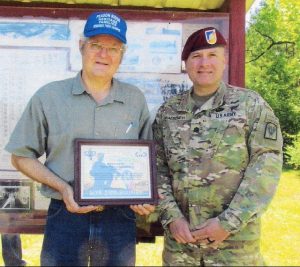
The last stop on the tour was at the Peason Memorial Park located on Hwy. 118. This park has two historical markers and photo kiosks for the public to visit. One historical marker is in memory and honor of the sawmill town of Peason and the other marker is in memory and honor of the Heritage Families of Peason Ridge. The ancestors of the Heritage Families were pleased to stand and have their pictures made at the historical marker honoring their families and the way of life that was lost by these families. The smiles from these ancestors of the Peason Ridge families told me that this tour was a great success! And at Peason Memorial Park Colonel Cannata and Lt. Colonel Graebener presented Rickey Robertson and the Peason Historical Foundation a Certificate of Appreciation for the contributions made to the U.S. Army and the Ft. Polk and Peason Ridge Live Fire Division. A very enjoyable day for the fifty-five people who came out for this tour. And let us always remember the sacrifice made by the Peason Ridge and Camp Polk Heritage Families as they gave up their homes, farms, culture, and way of life so that our freedoms could be preserved. And get ready for next year as we expand our tour route that will cover many more of the historical locations, cemeteries, and home sites on the 75,000 acres of Peason Ridge.
Rickey Robertson retired from the La. State Police in 2009. He was born and raised in the Peason Community in southeastern Sabine Parish. Rickey and his wife Patsy founded the Peason Historical Foundation Inc. in 2007 to gather and preserve the rich history of the sawmill town of Peason and of the settlers and homesteaders of Peason Ridge. They founded the Peason Memorial Park, which houses two historical markers and photo kiosks open to the public and they also have a small military museum at their home. Rickey is one of the few Heritage Family Members from Peason Ridge. Rickey writes historical articles for several local newspapers, and both local and national magazines.

